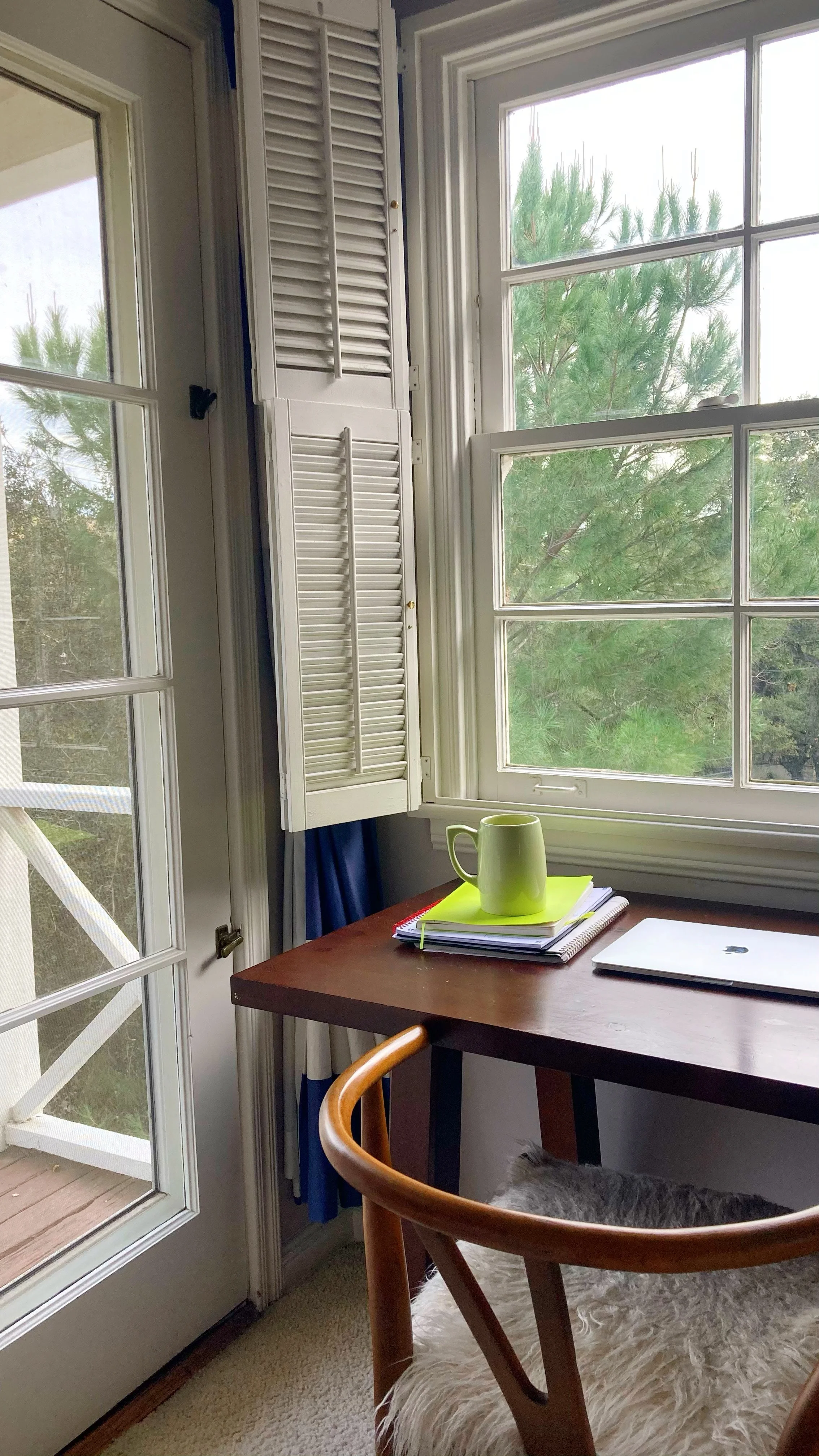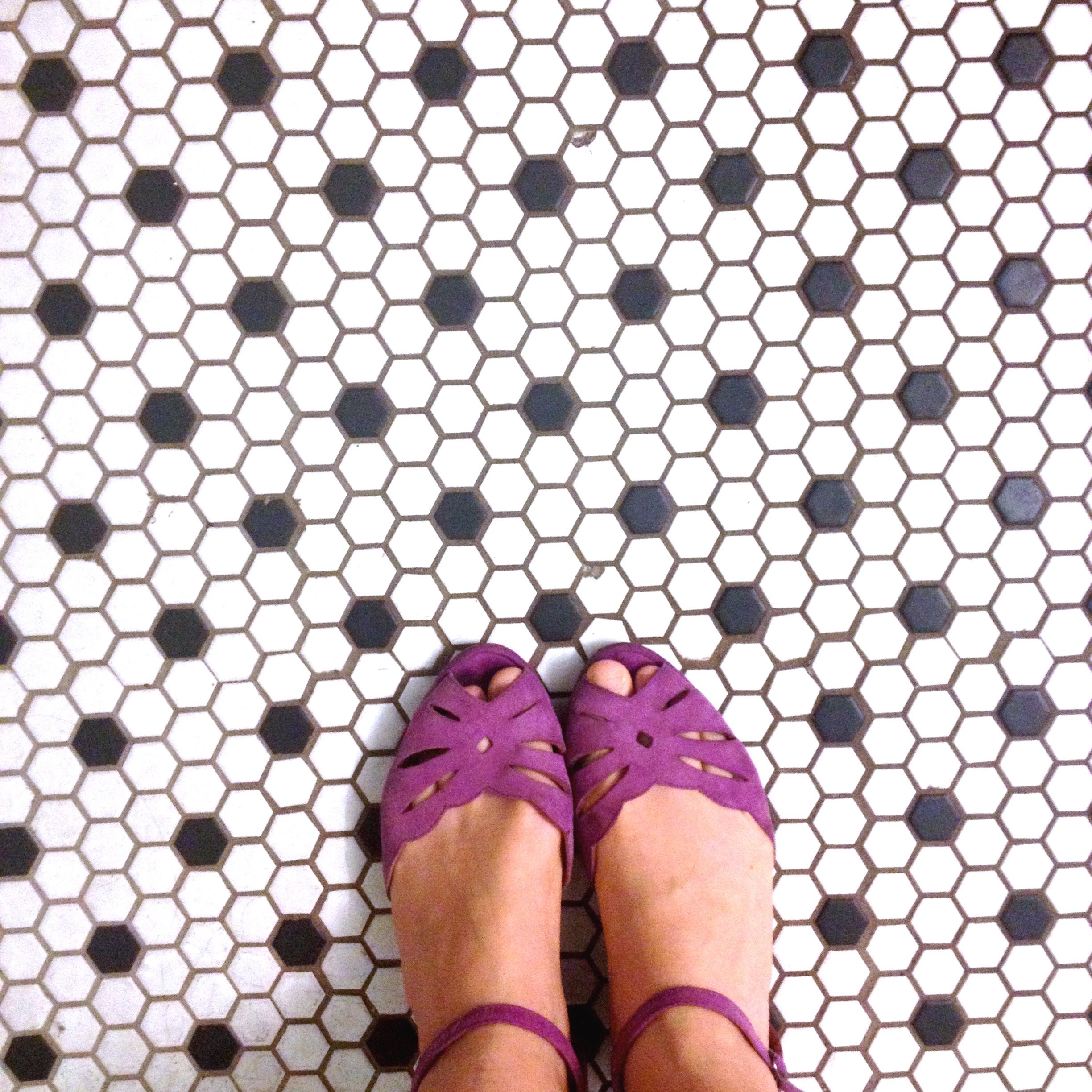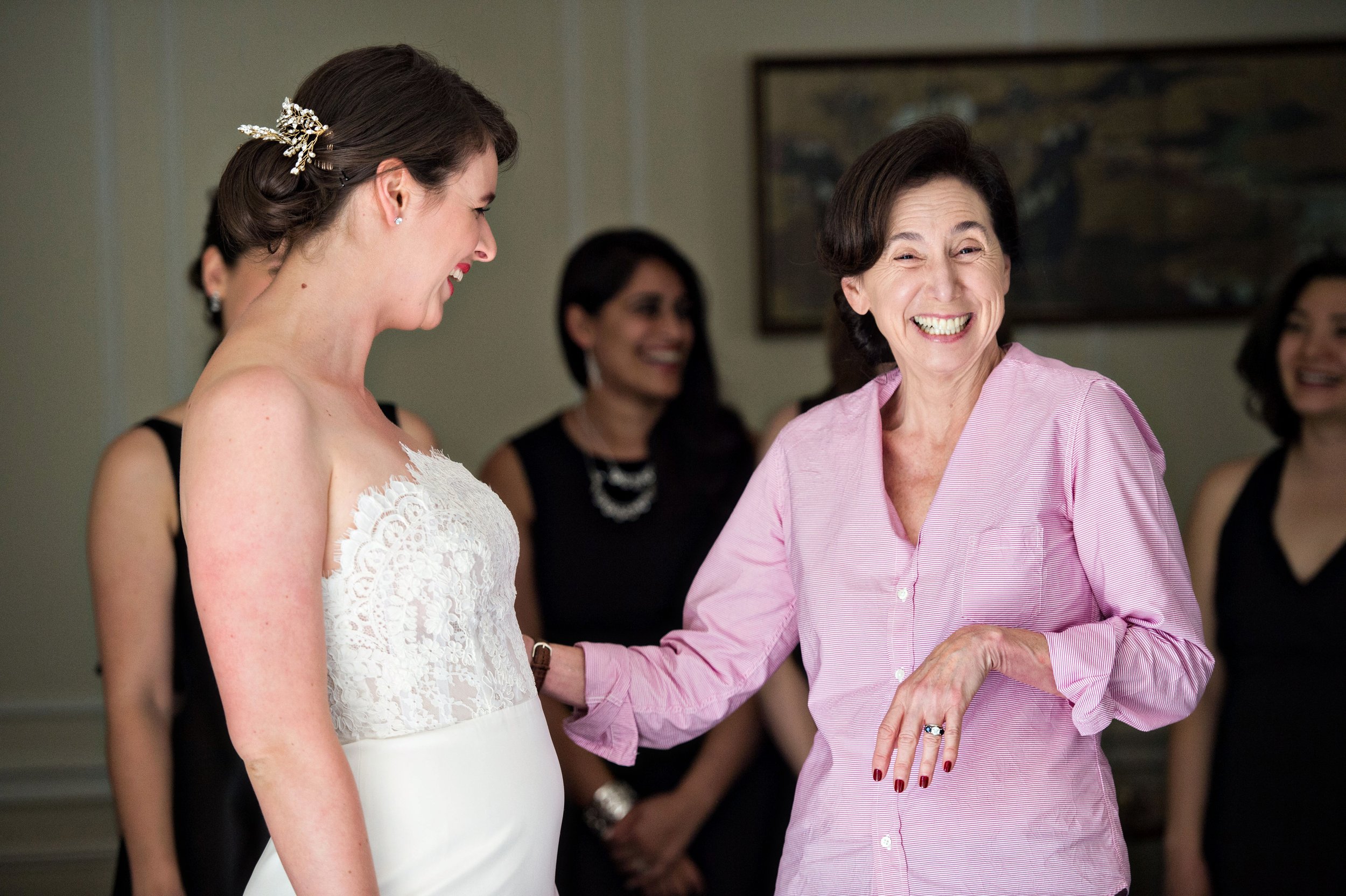Blog
Compasses are kind of like iPhones (Your Compass, Part II)
I’m starting this year by sharing some core concepts that I find most helpful to my clients — our compass + our engine. I’m starting with our compasses (here’s last week’s) – and I wanted to share another idea this week.
…
Today I wanted to share #1 misunderstanding about compasses that I find I have to explain to the world.
Here it is:
Compasses drained of batteries will only tell you that they are drained of batteries.
You know how when your iphone or your laptop is drained of battery, you can turn it on, it just shows the “battery is dead” sign, and then turns itself off?
The compass is 100% like this.
If human (metaphorical) compasses came with instruction manuals, they would say: Compass will not give directional information when drained of battery.
Often, when people get that battery-dead-turning-itself-off thing, they freak out and think their compass doesn’t work. When actually, your compass is totally working.
It is just telling you the one thing it really, really wants you to know, which is “you are tired.”
…
And this is, truly the #1 misunderstanding about compasses that I find I have to explain to the world. I tell it to clients very frequently. I told this to a friend just this week.
My friend was feeling stressed out + scared because she didn’t know what she wanted to do professionally. I asked her what she wanted to do, and she said:
You know, I just think if I was being honest, I don’t want a job at all. I’d love to never work again. But I can’t do that, financially, so I just feel trapped and like I have nothing to navigate by.
And it was very clear to me what the problem was.
So I told her: “Girl, your compass is working just fine. It’s just that when your compass is out of batteries, the only thing it’s going to tell you is to recharge the batteries. You’re not going to get any more information until there’s more juice in that thing.”
And then she laughed and was really relieved.
Because, she had been going through a busier time than usual, and she was genuinely tired. And she could quit her job to rest, of course, but she also could just prioritize rest more in her life as a whole, while keeping her job. Both are options.
…
But again, in these situations, the compass is working, it’s just doing what it is supposed to do, which is not to give a reading when it doesn’t have enough battery level.
So as my PSA for this month, please remember: Compasses drained of batteries will only tell you that they are drained of batteries.
…
As always, I’m rooting for you. You’ve got this.
Katie
P.s. Want to rebuild your compass? I highly recommend working with me 1:1. Learn more here about what it’s like to work with me, what past clients have said, and more.
Want to receive essays like this every Sunday morning? Sign up for my newsletter!
How to reconnect with your inner compass (Part I)
Remember how I said I wanted to talk about your compass + your engine this month? I thought we could start with the compass — that part of you that tells you what direction to go in life (since your engine isn’t that useful, if you don’t know what direction to go.)
So here’s one reminder:
The more you do use your compass, the easier it is to use.
Your compass — which we could also call your authentic truth, your knowing, your sense of “right”-ness — is like a muscle. The more you use it, the easier it is to use.
Ask a professional ballerina to lift her leg above her head – and she can do it immediately, and with ease.
Ask me to do it, and I can’t. I’ve spent almost no time building that muscle – it’s not strong enough, and the connection between me and my leg isn’t strong enough.
The more often you get in touch with your truest desires — about anything, including what you want to eat for dinner, whether you like that water bottle, or how you actually feel about your office mate — the easier those desires will be to hear about the more complex, thorny, subtle parts of life.
And the opposite is also true. The less you listen to your sense of truth, or authenticity, or right-ness, or whatever you want to call it — the harder it will be to hear.
…
Part of my job as a coach is to give my clients exercises to build their own know-your-true-desires muscles.
If you’re interested in doing a little muscle-building this month (a fascinating exercise to do especially around the holidays), here is one of the most common versions I give to my clients:
Strengthening your ability to listen to your yeses and no’s
Typically, I will just focus on either yeses or no’s – so pick one. For whichever one you choose:
Start by remembering what it is to feel a “yes” or a “no.”
Think of at least one time in your past when you felt a visceral, full-body yes or no –an 8 or a 9 on a 10-point scale.
Maybe it was walking into the house you eventually bought (a “yes!”), or when you dragged yourself to your job that you hated (a “no”)! Maybe it was the last time you went out with that boyfriend, when every part of you knew it was over (a “no”) — or when you realized you loved your wife (a “yes”).
The point is to re-remember what that physical sensation was like, so you can recognize it for step #2.For the next week, track your yeses or no’s.
Keep a running list, for the next 7 days, of every single yes (or no) you feel, plus some small notes about what the physical sensation in your body was like (“I felt a closing in my chest,” “my belly felt tight,” “my back felt expansive.”)
Many of these will be silly, trivial yeses or no’s. You might feel a yes (or no) about what shoes you’ll wear, about bedtime with your kids, about cleaning up your office.
But they are important – they are strengthening the muscle of listening, so you have it when you most need it.
…
I’m just going to say it again:
Your connection with yourself — with your authentic truth, your knowing, your sense of “right”-ness — is like a muscle. The more you use it, the easier it is to use.
Happy Know-Your-True-Desires Month, everyone ☺
As always, I’m rooting for you in the week ahead. You’ve got this.
Katie
p.s. Would you like to work with me 1:1? Here's what one past client said about her experience:
“I feel like I'm a lighter, happier version of myself and a better partner, friend, and coworker than I was a year ago (my boyfriend outwardly agrees to anyone I say that to).”
Learn more here.
Want to receive essays like this every Sunday morning? Sign up for my newsletter!
Back to the basics: Your engine + your compass
I’m not a big New Years Resolution-type. It never made sense to me to set splashy goals in a season when I typically just need a good veg on the couch.
Instead, this January, I thought it could be fun to return to some of my core concepts — the things I tell clients day-in, day-out. The basics we all need.
For today: Let’s talk about the two things you absolutely cannot do without, to have a life that works for you:
An engine
A compass
A compass is what tells you what direction to go in. And an engine is what actually takes you there.
You need both.
If you have an engine but no compass, you can be driving around all day (or all decade), but it never quite feels like where you truly want to be.
If you have a compass but no engine, you know what you want but cannot freaking make progress towards it.
Typically, if someone finds their way to me, they’ve got an issue with one or both.
(If it’s both, I tend to treat the compass first, because there’s no use in having a functioning engine if you exhaust the car driving in random directions).
In the next few weeks, I’ll give a couple of ideas on helping you with both your Compass + your engine, but two questions + two ideas to start us off right this new year:
Question: Which of these do you tend to rely on more? Your compass, or your engine?
Idea: It could be an interesting experiment, this January, to let yourself give your dominant mode a rest, and let the other take the wheel for a bit. Compass-dominant people might have a really powerful month of checking in with themselves less, and powering forward. Engine-dominant people might have their minds blown if they slow down for a bit and really get directionality right.Question: Is any of these completely broken and needs to be taken to the mechanic to be repaired, or completely revamped?
Idea: If so, what would your “mechanic” be? A game-changing book? A podcast? A conversation with an insightful friend? A therapist or a coach? Here’s more about working with me, if you’d like.
…
As always, I’m rooting for you in the week (and year) ahead. You’ve got this.
Katie
p.s. Ready to work on both your compass and engine in 2024? I’d highly recommend working with me 1:1. Learn more here.
Want to receive essays like this every Sunday morning? Sign up for my newsletter!
People who are good at everything + their common problems
Some percentage of people who work with me are what I call “People Who Are Good at Everything.”
People Who Are Good at Everything are not good at absolutely everything. But they are often excellent in at least a few of the following ways:
Their bosses love them
They get great feedback at work
They are skilled in sports and/or the arts
They were excellent students
They are charming and charismatic with new acquaintances
Many people want to date them
Of course, there are clear advantages to being someone who is Good at Everything.
And yet, I have also noticed as a coach, that some (though not all) People Who Are Good at Everything develop a common problem.
It’s this: They forget how to know what they want.
…
We might assume that People Who Are Good at Everything would be excellent at knowing what they want. After all, they have so many amazing options to choose from — whether that be jobs, girlfriends, or colleges.
And yet, I have observed that some People Who Are Good at Everything can become quite disconnected from what they want, for at least three reasons:
They become addicted to being appreciated and adored.
Several of my clients who are Good at Everything have excelled at jobs that they didn’t particularly like anymore. It was hard to leave, because they were getting such great feedback from their bosses and colleagues and clients. Everyone adored them! They were killing it!
I’ve also witnessed someone who was very good at getting boyfriends to adore her, who stayed for months and sometimes years in relationships in which she didn’t adore the boyfriend. It felt so good to be adored!
Of course, positive feedback is important. But also, we can become over-reliant on it, to the point that we value them-liking-us so much, we forget about the importance of whether we like them.They are particularly susceptible to valuing impressiveness over their personal truth.
This is not to say that the impressive choice is never the right choice – sometimes it is! But for some People Who Are Good at Everything, their default becomes to just pick the impressive choice — because it is elite, because other people want it, because they can.
When we, over and over, default to picking the impressive choice without deeply inquiring about whether it is authentically right for us — our ability to even know what we want can atrophy…because we’re not using it.They can be unaccustomed to the discomfort of going after something that they want.
Sometimes, People Who Are Good at Everything can get accustomed to things coming easily. They are used to a lot of positive feedback, and a lot of great options.
But what they authentically want might require seeking out something that is not currently choosing them — they might have to go out there and get that job, relationship, or opportunity. They might face uncertainty on that journey, and come up against rejection and failure many times. This — to put it mildly — can totally suck.
For people who are not Good at Everything, well, this is just how life is — you gotta go after what you choose, things often don’t choose you.
But People Who Are Good at Everything sometimes lack those calluses, those muscles. They sometimes think that if something isn’t choosing them right now…it’s not meant for them.
But that isn’t necessarily true. It can just be that going after what you want can be really tough.
…
I wanted to share this concept because I suspect that many of you reading this are also People Who Are Good at Everything.
You don’t have to be a supermodel or a Heisman Trophy winner to be someone who is Good at Everything. You could be like this in only your professional life, or only your romantic life, or only in your friendships.
It has been empowering for my clients to hear that there are a specific set of problems that sometimes come along with being this type of person.
And, of course, while solutions are always deeply personal, there are also some common themes:
Re-remember how to know what you want, and how to be with the discomfort of the journey. Make sure your compass and engine are strong.
Reach out for help and support if you need it – I’d highly recommend working with me 1:1, if you’re feeling intrigued.
As always, I’m rooting for you. You’ve got this.
Katie
p.s. One of my clients who recently finished working with me wrote:
""These are lessons that I could potentially have learned ""on my own"" after another 1-2 decades of life experience, but the fact I have made such progress in 12 months means that working with Katie has easily been the best investment I've made in myself in my adulthood.""
I feel so moved by her saying that. If you'd like to work with me — I currently have two openings for new clients — learn more + reach out here.
Want to receive essays like this every Sunday morning? Sign up for my newsletter!
The intimidating journey
Just something small to share this week. It’s a passage from one of my favorite books — Swamplands of the Soul, by James Hollis — which has been haunting me lately.
Hollis writes:
“Indeed, next to the fantasy of immortality, the hardest fantasy to relinquish is the thought that there is something out there who is going to fix us, take care us—spare us the intimidating journey to which we have been summoned.
“No wonder we run from such a journey, project it onto gurus, never quite at home with ourselves.”
…
Something electric flashes up my spinal cord every time I think about “the intimidating journey to which we have been summoned.”
When we are quiet, unstimulated, many of us have a sense of what we are being summoned to do next. It might not be saving the world — it might just be getting our affairs (or our brains, our emotions) in order. But there is something for us to do, and no one can do it for us.
So I will invite you to ask yourself: what is the journey to which I am being summoned?
And: How can I stop running from it?
Because, in my experience, true satisfaction and meaning comes from heeding the call.
Always.
…
I’m rooting for you in the week ahead. You’ve got this.
Katie
p.s. Hollis is right: no one can spare you from your own “intimidating journey.” But working with me can provide just enough clarity, insight, and encouragement that you won’t run from it anymore — so you can take steps forward and build long-term momentum.
Learn more about working with me + apply for a consult here.
Sign up for my newsletter to get helpful + encouraging essays like this every Sunday morning. It’s free!
One of my role models
I originally wrote this in 2015, but wanted to re-share it, with some edits, in honor of Mother’s Day, and because a newsletter reader recently told me that it was her favorite piece I’ve ever written. (Ever! What an honor!)
…
I learned about exercise by watching my mom.
For my entire life, my mom has taken daily, 3-mile walks. She’s not fancy or precious about it – she just laces up her sneakers, wears old shorts and a t-shirt, and walks the same route in our neighborhood every single day.
It takes her about 45 minutes. But if she doesn’t have much time, she’ll squeeze in a 20- or 30-minute walk.
That’s it.
Here is a photo of me and my mom, before my wedding.
The thing that I have come to appreciate, particularly as I’ve gotten older, is how un-fussy and easy she is about it.
She’s not looking for a form of exercise that is painful, or that she dreads.
On the contrary, she walks because it makes her feel good – it clears her mind and makes her feel calm and happy.
She likes being outside, and she doesn’t have time to drive to an exercise class.
Of course, she also does it because it’s good exercise. Walking nearly every day for most of her life has helped her to stay fit and healthy and looking good, in my humble daughterly opinion (hi mom!). But walking isn’t something that is intensely painful or only feels good “after.” It feels good from the first step.
Part of the reason I wanted to share my mom’s story is because I’ve come to realize how deeply powerful behavioral modeling can be. It’s one thing to “get” something intellectually, and it’s a very different thing to see it in action, over and over.
I saw my mom lace up her sneakers, walk out the front door, and return revived and refreshed, every day of my life.
It wasn’t a big deal.
It wasn’t hard or painful.
It didn’t take much time.
It didn’t cost anything.
It didn’t require a ton of willpower.
She liked it, it was easy and felt good. So she did it every day.
I think that too often the “role models” for fitness that we see and think we should aspire to are people who are running marathons, or who have perfectly toned arms or six-pack abs. We think that we're supposed to want and work toward that level of fitness.
And we often think that it has to be time-consuming, expensive, complicated, or painful.
My mom showed me a different way.
Of course, I’ve tried intense workouts over the years. And I do enjoy a Pilates or yoga class once or twice a week, even though I have to drive to them, and they cost money.
But I always come back to my daily walk.
So I wanted to share it with you. Both to talk about exercise and about role models in general.
To talk about exercise: I don’t see this approach to exercise –moderate, super-easy, not-painful, cheap, and pleasant – advertised as much as I think it should be. With that in mind, my challenge for you this week is to take a walk. I mean it. If you live in a place where it is safe to do so, put on those sneakers, get outside, and move in a way that isn't hard.
To talk about role models: So often, our role models are super-intense, at-the-top-of-their-fields, could-be-on-the-cover-of-a-magazine kind of people. But is that who our role models should truly be?
As always, I’m rooting for you. You’ve got this.
Katie
If this essay resonated with you, you'll love my newsletter. Sign up for free + get new ideas every Sunday!






